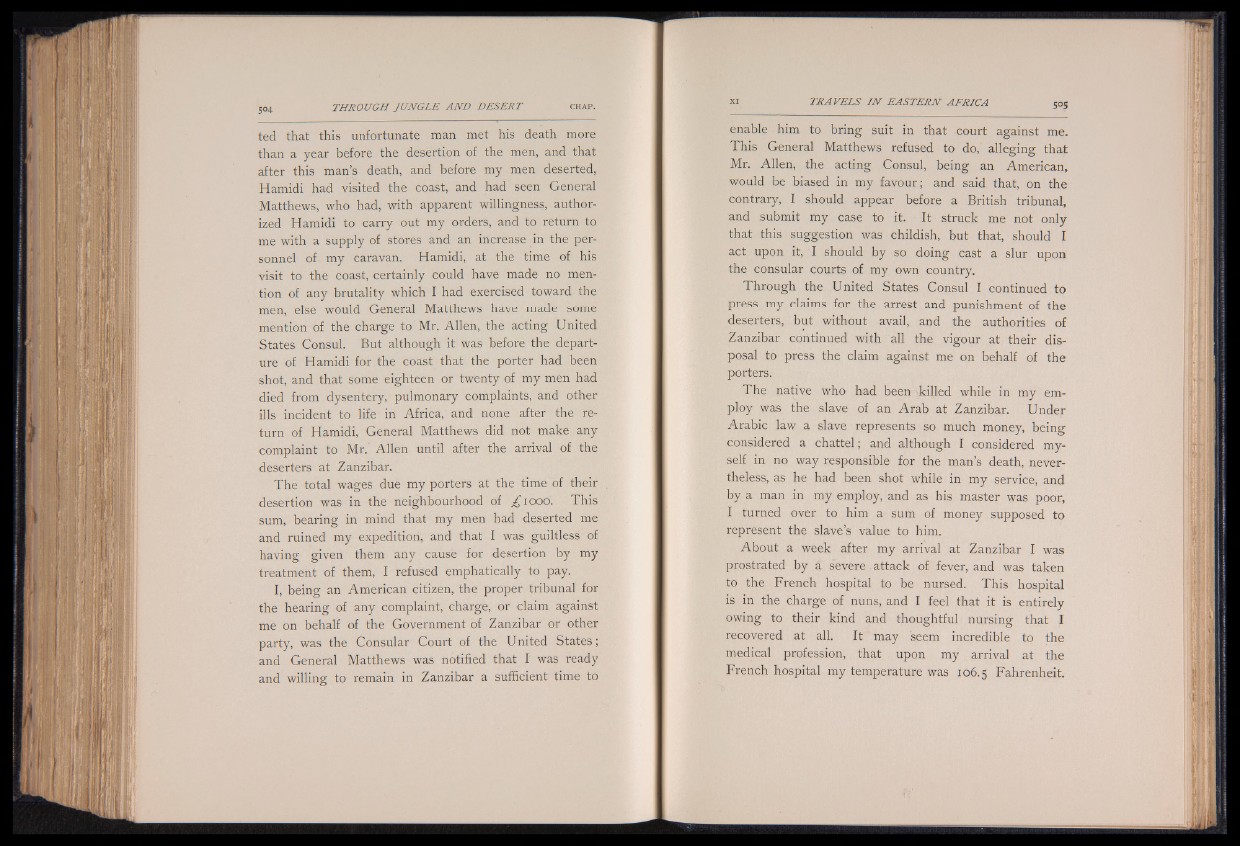
ted that this unfortunate man met his death more
than a year before the desertion of the men, and that
after this man’s death, and before my men deserted,
Hamidi had visited the coast, and had seen General
Matthews, who had, with apparent willingness, authorized
Hamidi to carry out my orders, and to return to
me with a supply of stores and an increase in the personnel
of my caravan. Hamidi, at the time of his
visit to the coast, certainly could have made no mention
of any brutality which I had exercised toward the
men, else would General Matthews have made some
mention of the charge to Mr. Allen, the acting United
States Consul. But although it was before the departure
of Hamidi for the coast that the porter had been
shot, and that some eighteen or twenty of my men had
died from dysentery, pulmonary complaints, and other
ills incident to life in Africa, and none after the return
of Hamidi, General Matthews did not make any
complaint to Mr. Allen until after the arrival of the
deserters at Zanzibar.
The total wages due my porters at the time of their
desertion was in the neighbourhood of £ i ooo. This
sum, bearing in mind that my men had deserted me
and ruined my expedition, and that I was guiltless of
having given them any cause for desertion by my
treatment of them, I refused emphatically to pay.
I, being an American citizen, the proper tribunal for
the hearing of any complaint, charge, or claim against
me on behalf of the Government of Zanzibar or other
party, was the Consular Court of the U nited States;
and General Matthews was notified that I was ready
and willing to remain in Zanzibar a sufficient time to
enable him to bring suit in that court against me.
This General Matthews refused to do,' alleging that
Mr. Allen, the acting Consul, being an American,
would be biased in my favour; and said that, on the
contrary, I should appear before a British tribunal,
and submit my case to it. It struck me not only
that this suggestion was childish, but that, should I
act upon it, I should by so doing cast a slur upon
the consular courts of my own country.
Through the United States Consul I continued to
press my claims for the arrest and punishment of the
deserters, but without avail, and the authorities of
Zanzibar continued with all the vigour at their disposal
to press the claim against me on behalf of the
porters.
The native who had been killed while in my employ
was the slave of an Arab at Zanzibar. Under
Arabic law a slave represents so much money, being
considered a chattel; and although I considered myself
in no way responsible for the man’s death, nevertheless,
as he had been shot while in my service, and
by a man in my employ, and as his master was poor,
I turned over to him a sum of money supposed to
represent the slave’s value to him.
About a week after my arrival at Zanzibar I was
prostrated by a severe. attack of fever, and was taken
to the French hospital to be nursed. This hospital
is in the charge of nuns, and I feel that it is entirely
owing to their kind and thoughtful nursing that I
recovered at all. It may seem incredible to the
medical profession, that upon my arrival at the
French hospital my temperature was 106.5 Fahrenheit.